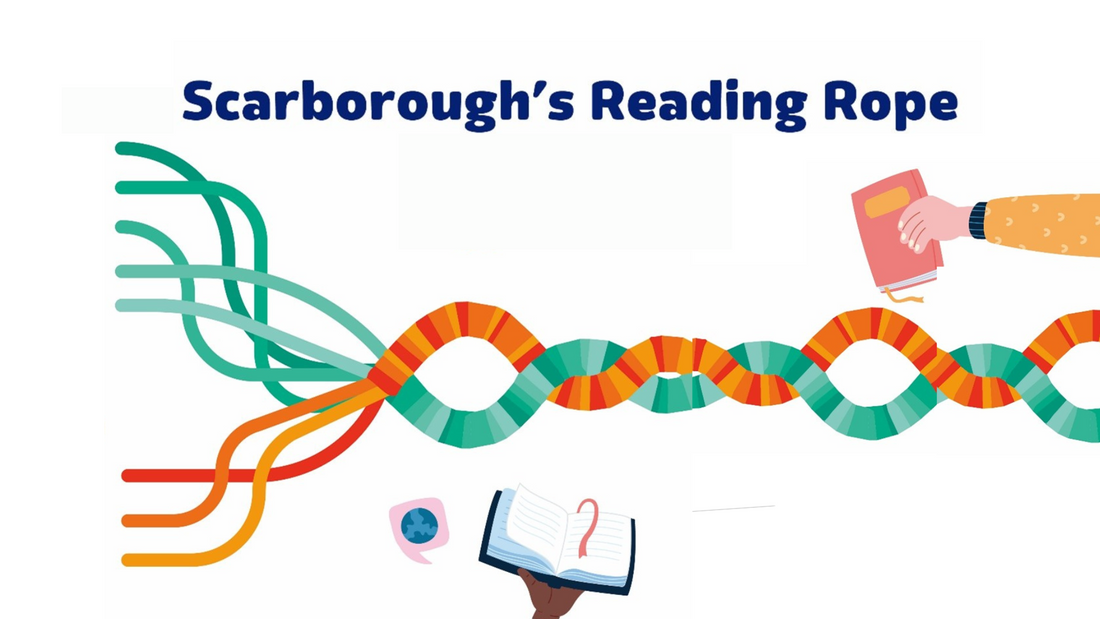Have you ever watched your kid slowly sound “C-A-T spells cat” and wondered how they will master reading a high school physics textbook someday?
The answer is complicated! But in 2001, the educator Dr. Hollis Scarborough published a diagram called “The Reading Rope” that brings all the pieces together. Check out our version.

Skilled reading happens when your kid recognizes words and understands what they read. Word Recognition covers learning the letters, connecting them to sounds, putting them together into words, and memorizing the words that break all the rules.
Language Comprehension is even more complex! It is connecting the decoded words to real-life objects and ideas, understanding grammar, making educated guesses about new words, interpreting the text, and mastering thinking skills like inferencing, deduction, and summarizing.
When kids are young, we can focus too much on the word recognition part. But comprehension is half the journey, and it is the reason kids want to read. So here are at-home tips for each reading skill area:
Background Knowledge
- Expose your kids to life experiences! A visit to the ballpark will make it easier for them to read a baseball story. Naming the vegetables at the store will make it easier for them to read a book about food.
- Nonfiction isn’t just for adults! Anatomy books like The World in Me, or books about animals like Who Am I? give kid-friendly introductions to the marvels of our world.

Vocabulary Knowledge
- Don’t dumb down your language – kids have to hear it before they can read it. Use your full vocabulary and they’ll slowly pick it up.
- Connect words your kids know to new words. If they love cucumbers, talk about how tasty and healthy cucumbers are.
- Learn words by groups. Books like Moo Moo Cow and My First Words introduce words by topic to give a helpful boost.
Language Structures
- It might sound crazy, but kids soak up grammar! Give kids lots of contrastive sentences, pairing present and past, singular and plural, and possessives: “When you were little, we went to the playground. Now, we go to the library.” “These are my feet, and those are your feet.”
- As you read books, point out action words (sing, jump, laugh) and thing words (bus, duck, apple). You’ll be surprised at how quickly a 6-year-old can pick up the categories!

Verbal Reasoning
- Read books that encourage your kids to ask questions and make connections about the physical world, like I Get It! If they are interested in a particular topic, like ice cream or pools, check out a book from the library.
- Read stories that connect to their experiences and have with discussion questions, like Brown’s Class. Help them make the leap from the characters’ emotions to their own.
Literacy Knowledge
- Talk about what happened in a story after you read it. Ask questions like, “What was the funniest part?” or “Which animal was your favorite?” Use words like author, illustrator, and
- As you read, point out punctuation. Use words like paragraph and sentence to describe what you see: “Great job reading the first sentence! Let’s try the second sentence.”

Phonological Awareness
- Use structured series like Veggie’s World to work on specific phonemes.
- At dinner or in the car, play simple games that require your kid to use phonemes. For example, “Tell me 10 words that start with M,” or “What’s a word that rhymes with dad?”
Decoding and Spelling
- Write down nonsense words for your kids to sound out, and have them do the same. Make up silly meanings to build a secret family vocabulary! “Spadoodoo is the crumbs you spill in the car.”
- Read tongue twisters and alphabet books that focus on specific sounds, like Sound Foundations.

Sight Recognition
- Point out sight words when you see them (in ads, billboards, street signs, etc.) and spell them out together.
- Read goofy short stories like Breakfast Buddies that are designed to give practice in the words kids have to memorize.
Unlike talking, reading is a learned skill that takes lots of practice. But with the right books and family activities, it doesn't have to be a chore!

